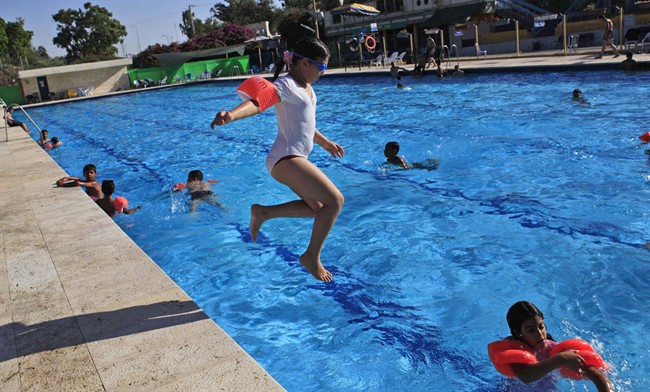Sweat, sunscreen and urine – while we turn a blind eye, we all know what we’re getting into when we jump into a pool or hot tub. But U.S. scientists say health issues surface when chlorine and other disinfectants interact with the substances we add to the water, creating harmful compounds.

In a new report, the American Chemical Society warns that public pools “are not always as clean as you might think, even when disinfected.” And the more these facilities are used, the more likely harmful compounds buildup.
“Studies of swimming pools have identified many of the resulting compounds, called disinfection byproducts. And testing has shown that they can cause genetic damage to cells in lab settings,” the ACS said in a statement.
“Other reports have found that some people who swim or work in and around pools have higher rates of certain health problems, including respiratory symptoms and bladder cancer,” the statement read.
READ MORE: 6 steps to kill the germs on your hands
For their own research, the ACS team studied water samples from public and private hot tubs and pools after both normal and intense use.
They found more than 100 byproducts in the water from when the disinfectant interacted with urine, sunblock, sweat and other compounds.
Their next steps were to consider if these byproducts were harmful. In that case, they found that hot tub samples were about 2.4 to 4.1 times “more mutagenic” – or genetically altered – than original tap water. The more the hot tub water was used, the more the concern increased.
READ MORE: Public bathroom hand dryers ‘splatter’ germs everywhere, research suggests
But keep in mind, this study isn’t answering how these byproducts tamper with human health or even how long we’d have to swim in the water to encounter any issues.
The ACS offers a solution, too: pool and hot tub operators could drastically cut back on the risk of disinfection byproducts by changing the water more regularly.
Swimmers could also shower before heading into the pool, and, of course, head out of the pool to use the washroom when nature calls.
Read the ACS full report here.
carmen.chai@globalnews.ca
Follow @Carmen_Chai


Comments